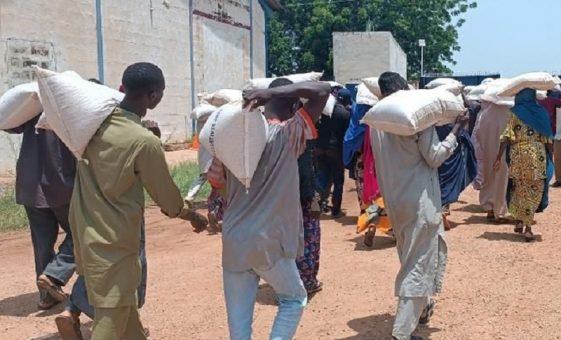Some years are remembered for the wars they birthed, others for the peace they sustained. Yet, 2024 will be etched in Nigeria’s memory as a year of trials by flood, fire, and famine. In the storm-tossed annals of the year, no figure looms larger than the vulnerable Nigerian – a silent warrior navigating tempests both natural and man-made. From the floodwaters of Maiduguri to the scorched remnants of Bodija, from the ruins of economic collapse to the invisible sacrifices of villagers displaced from their homes by bandits in the Northwest and vengeful soldiers prowling Okuama, in the Niger Delta, the vulnerable Nigerian has borne the weight of a nation’s failures and emerged as an architect of hope.
In September, the rains came not as a blessing but as a curse, birthing a deluge. The waters rose, first as whispers, slithering through the streets of Gwange like a reptilian beast, until it became a roar that swallowed homes and histories. The collapse of the Alau Dam unleashed an apocalyptic flood, submerging Gwange and Maiduguri in chaos. Blind grandmother Zara Aji, plucked from the deluge by her teenage grandson Mohammed, became a symbol of love-defying calamity. Mohammed’s strength – wading through waters that clawed at him with relentless ferocity was a living metaphor for hope enduring even as the world drowned around him.

The collapse of the Alau Dam was a calamity foretold – years of neglect had weakened its structure, and torrential rains became the final blow. What followed was not merely a flood but a merciless erasure of lives, homes, and livelihoods. The blind, the elderly, and the disabled bore the brunt of this disaster, their vulnerabilities amplified by society’s indifference.

En route to the September deluge, Nigeria startled, on January 16, to a fire outbreak in Bodija, Ibadan, Oyo State – and this set the tone for a slew of calamities for a citizenry still grappling with a comatose economy and the austerity imposed by removal of fuel subsidy and floatation of the naira. President Bola Tinubu’s gospel of “Renewed Hope” struggled for resonance before a people assailed by soaring food prices and hardships that outstripped their means.
The government’s plea for patience and understanding predictably fell on ears tuned to the dirge of unfulfilled promises by previous administrations. The man who cannot afford to eat today will not be consoled by promises of a feast tomorrow.
Yet amid the hardships, 2024 has been a year when survival was an act of rebellion. And in this rebellion, the vulnerable Nigerian has stood tall – battered yet unbowed, invisible yet indomitable. While the world looked toward the metropolises of power for its champions, this individual emerged as a quieter yet more profound figure of resilience from the shadows.
The human spirit, like a reed in the storm, bends but does not break. In 2024, the Nigerian people – scattered across bustling markets, flooded streets, and impoverished neighbourhoods – became a paragon of this truth.
Consider the Abayomis, a family in Orile-Agege, Lagos. Once part of the middle class, they now navigate the shadowy edges of poverty. Kunle Abayomi, a civil servant, fights the relentless battle of stretching N100,000 to feed his family of six.
His wife, Folasade, juggles dual roles – educator by day, trader by night – while their children, eyes wide with dreams, watch their parents’ struggle with the stoicism of veterans.
Inflation, the silent thief at 32%, ravages the Abayomis’ earnings. Kunle’s paycheck, a mere ghost of sufficiency, vanishes like dew under the sun of escalating costs. For Wale, the eldest son, the Nigerian Dream – a vision of prosperity – has dimmed into a distant mirage.
No doubt, the plight of those submerged by the Borno floods or left homeless by the Ibadan disaster is heart-wrenching. Yet, beyond these calamities lies a deeper wound – the pervasive economic hardship that has gripped millions. Aside from the Abayomis, families like the Ezeigbos of Surulere fight to keep afloat in an economy where survival is a gamble. Chidi Ezeigbo, an electronics trader, and his wife, Nkem, a vegetable vendor, embody this struggle. Each day is a wager, their efforts constantly undercut by fluctuating exchange rates and rising prices.

For individuals like Habeeb Olamide, a steel constructor, the ripple effects of economic decline manifest in dwindling opportunities and the need to juggle multiple jobs. “We’ve learned to adapt,” said Habeeb, his voice weary yet resolute. Crime is never an option. Perseverance is his family’s only hope.
Across Nigeria, economic hardship did not just strain wallets; it reshaped the very fabric of family life. Traditional gender roles, long enshrined in the patriarchal ethos, began to blur as the archetypal patriarch, once a figure of unchallenged authority, now shares his throne with women who step into roles once deemed unconventional.
Folasade Abayomi, Nkem Ezeigbo, and countless others are not just wives or mothers; they are breadwinners and strategists, navigating the maze of survival with ingenuity and resolve. Yet, this shift is not without its tensions. For several families, the shifting balance of financial power sowed discord, challenging long-held notions of authority and unity. What began as a joint effort to navigate economic turbulence in most families evolved into a silent war. For instance, Funmi Adeoye’s flourishing thrift business, once a symbol of hope, became an unspoken challenge to her Tayo’s authority thus ripping apart their marriage.
For decades, the Nigerian Dream shimmered as a lighthouse of hope – a promise of upward mobility, wealth, and security. Today, it stands fractured, its once-clear vision obscured by the haze of economic turmoil.
The family, once a solid institution, now stands like a cracked mirror, reflecting the distortion of a once-cherished social ideal. For many it’s prosperity, for others, its career success, stardom or decent living. The parameters for ascertaining true prosperity vary from family to family, from one individual to another.
Gender roles have shifted, authority has been questioned, and the lines between right and wrong have blurred beyond recognition, argued Adeyinka Somide, a sociologist and retired headteacher. According to her, the long-held values that commanded visions of success and integrity among her generation has been so badly corrupted that all that’s left “are shreds of memories of how cultured, honest and God-fearing we once are.”
As families struggled to recalibrate their lives in the wake of economic upheaval, they are faced with the harsh truth: survival often demands compromise. Fathers who once stood tall have bent under the weight of necessity. Mothers who once preached virtue learnt to permit some ‘harmless’ vice. Sons and daughters, once guided by the moral teachings of their homes, wandered through a world of crime and moral ambiguity, driven by a sheer will to survive.
Amidst the turmoil of economic hardships, families who refuse to succumb to crime forge creative survival strategies. In Lagos, they pooled resources, shared homes, and rotated childcare to reduce costs. Jeremiah Alase, for instance, formed an ajo (cooperative savings group) with neighbours, including two NYSC graduates, in his Idimu, Lagos community. Each month, members contribute N25,000 and take turns receiving the pooled funds.
“We prefer this to banks. Banks only fund the rich with our deposits,” Alase explains. “This ajo has been a lifeline, helping us handle unexpected expenses like school fees or medical bills.”
The stories of the Abayomis, Ezeigbos, and Adeoyes are not isolated. They are threads in a larger tragedy that runs through the heart of Nigerian society.
No one can pretend we didn’t see this coming. The signs had always been evident as the noonday sun, looming for decades. Many saw it unfold but preferred to shrug it off, imagining that the ship of state was still on course, even as it drifted towards the gorge.
But the worst has dawned in real-time. The consequences pervade the country, palpable in the air, like a suffocating fog clinging to every breath.
The vulnerable Nigerian is not simply a survivor of 2024’s tragedies – they are a mirror reflecting the best and worst of our collective humanity. Their lives tell stories of a country that has failed its most fragile citizenry yet relies on their silent strength to persevere.
They are the widows who wait for aid that never comes, the disabled left behind in the chaos of evacuation, the displaced who rebuild with nothing but hope. They are Mohammed, carrying his grandmother through floodwaters; they are the Abayomis’ four children—Wale, 16; Tolu, 14; Jide, 11; and Bolu, 9 – who see their parents hustle paycheck to paycheck, and know all too well, why the Nigerian dream feels increasingly out of reach; they are 15-year-old Ali, who faded away into the midnight currents of September 9 – never to be seen again – as he honoured his mother’s request for him to save “those who cannot help themselves.” The 15-year-old nodded in silent affirmation to his mother. The palpable fear on his face conveying his brutal awakening and chilling resonance of the moment – he was a child thrust by serpentine waters into the role of a man. His mother, Halima Mohammed, cried as she recalled watching him slink off into the tempest – amid the guttural wails of frightened families and drowning neighbours, she watched her son vanish completely from her sight. These unsung heroes held up the world as 2024 crumbled around them.
As the hardships persists…
To name the vulnerable Nigerian as the Person of the Year is not merely to honour their resilience; it is a call to action. It is a reminder that the survival of the nation hinges on the survival of its most fragile.
As the floodwaters recede and the flames die down, the scars remain – on the land, on the people, and on the collective conscience of a nation grappling with severe economic hardships imposed by surgical policy reforms. These scars are a challenge to policymakers, aid organisations, and every Nigerian to ensure that vulnerability does not mean invisibility.
The government, social workers, activists, and survivors must work together to achieve systemic change: better infrastructure, inclusive disaster response plans, and targeted support for the marginalised.
To truly honour the vulnerable, the nation must rise beyond rhetoric – and reignite hope in the national enterprise.
The vulnerable Nigerian stands as a testament to the resilience of the human spirit, reminding us that while economic hardship and nature’s wrath may be inevitable, our response to them is not. In their survival, they teach us that resilience is not a gift but a shared responsibility. They are the epitome of courage, the bearers of burdens, and the silent architects of hope.
The poetry of their endurance embellishes the Nigerian narrative of 2024.
Stay ahead with the latest updates!
Join The Podium Media on WhatsApp for real-time news alerts, breaking stories, and exclusive content delivered straight to your phone. Don’t miss a headline — subscribe now!
Chat with Us on WhatsApp








